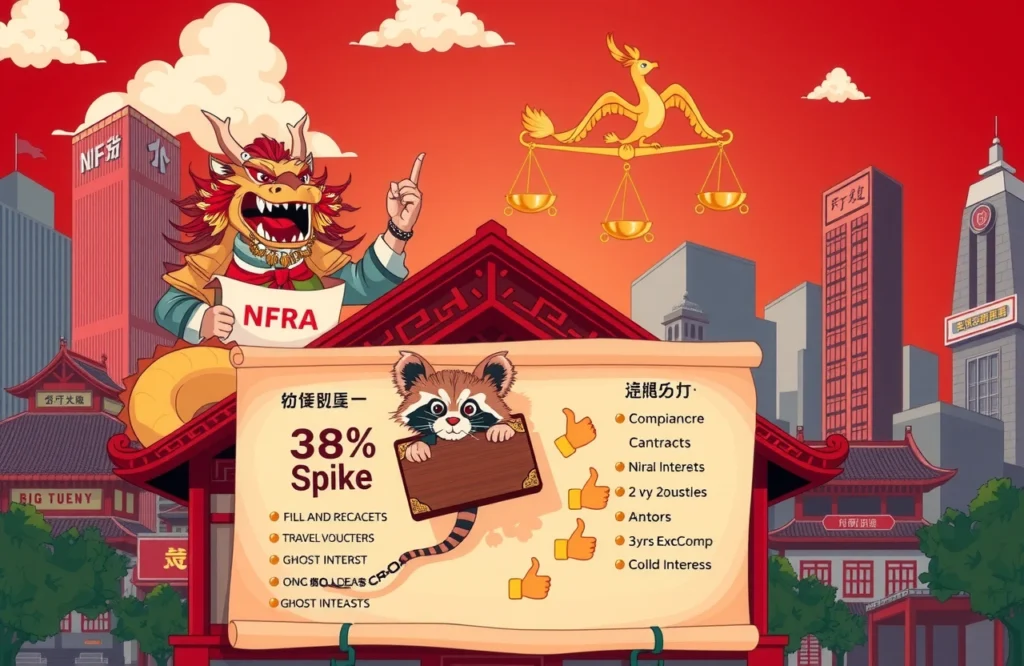Executive Shifts Signal Strategic Transformation
The management landscape at Dalian XinDaMeng is undergoing seismic changes following the resignation of veteran Wanda executive Xiaoguang Rui (肖广瑞). The July 7 announcement from Zhuhai Wanda Commercial Management Group confirms Rui stepped down as CEO of both Dalian XinDaMeng and its subsidiary for personal reasons. This departure accelerates what industry insiders term the ‘de-Wanda-ization’ process – a strategic shift reducing Wanda’s historical influence since PAG-led investors acquired controlling interest last March.
Leadership Reshuffle Details
- Huang Dewei (黄德炜) appointed CEO and Chairman of both entities
- Huang Dewei and Hu Zhengwei (胡正伟) named Co-Chairmen
- Executive appointments effective immediately with updated leadership profiles
The New Leadership Composition
Huang Dewei brings significant institutional weight to his expanded role as PAG’s China President and Co-Head of Private Equity. His counterpart Hu Zhengwei represents Abu Dhabi Investment Authority’s (ADIA) private equity division as China Head. Together they form a powerful dyad reflecting XinDaMeng’s investor consortium which secured 60% control through their 60 billion RMB ($8.3B) investment. The leadership overhaul arrives eight months after Rui vanished from public view following his October 2024 resignation as chairman of predecessor entity Dalian Wanda Commercial Management.
PAG’s Growing Influence
Often dubbed Asia’s ‘Little Blackstone’, PAG exerts considerable influence through its $55+ billion AUM portfolio. Founded by Shan Weijian (单伟建) alongside Chris Gradel and Jon-Paul Toppino, the firm counts Blackstone as its third-largest shareholder according to SEC filings. This management transition solidifies PAG’s operational control beyond majority ownership – a significant evolution from the pre-2024 structure where Wanda veterans occupied all key positions.
The Fallout of Financial Pressures
The accelerating de-Wanda-ization traces directly to Wang Jianlin’s landmark 2023 concession: Facing collapse of the Zhuhai Wanda Commercial Management IPO and consequential $4.2B repayment obligations to pre-IPO investors, the Wanda founder accepted PAG’s capital infusion framework. This December 2023 agreement birthed Dalian XinDaMeng as holding company, ultimately attracting consortium partners CITIC Capital, Ares Management, ADIA, and Mubadala Investment Company by March 2024.
Xiaoguang Rui’s Legacy
The departing executive followed a non-linear path through Wanda’s hierarchy since joining in 2001. Originally leading human resources rather than core operations, Rui’s 2021 appointment as President of then-Wanda Commercial Management signaled Wang’s trust. However, his tenure proved unstable – initial resignation after five months preceded two subsequent appointments before April’s final departure. XinDaMeng’s official statement noted: ‘Wanda Group expressed high recognition for achievements during Rui’s tenure, particularly light-asset transformation and key project execution.’ The carefully worded acknowledgment suggested potential future collaboration in cultural tourism ventures without committing to re-engagement.
The Mechanics of Organizational Transition
The de-Wanda-ization process extends beyond executive departures into fundamental governance reconstruction. Investor consortium representatives now dominate board positions acquired through the strict voting rights provisions accompanying their 60% equity position. While exact board composition remains confidential, multiple sources report Wanda’s traditional operational autonomy has been superseded by investor oversight mechanisms.
Strategic Implications
- Operational models shift from developer-centric to investor-controlled cashflow optimization
- Expansion strategies prioritize consistent yields over aggressive portfolio growth
- Potential divestment of non-core assets acquired during Wanda’s diversification phase
- Increased standardization across XinDaMeng’s 425 commercial properties internationally
The Broader Industry Impact
XinDaMeng’s de-Wanda-ization represents China’s largest commercial real estate restructuring since Evergrande’s default. Industry analysts note parallels with Guangzhou R&F’s 2023 recapitalization and Longfor’s gradual governance transformation. For assets under XinDaMeng management – including 210 domestic shopping malls and prominent projects like Wuhan Han Street – operational continuity appears secured despite leadership transitions.
International precedents suggest mixtures of volatility and opportunity often follow similar ownership transitions. When Brookfield replaced founder CEOs at General Growth Properties and Forest City Realty Trust, stock performance fluctuated before stabilizing as rebranding took effect. The crucial differentiation: XinDaMeng inherits both performing assets and unresolved liabilities including lease renegotiations with anchor tenants like Walmart China and Wanda Cinemas.
Prospective Challenges
- Integrating historically siloed regional management teams
- Refinancing $2.9B Wanda-era debt maturing through 2026
- Navigating property valuation adjustments amid market uncertainties
Path Forward for Chinese Commercial Real Estate
XinDaMeng’s unfolding transformation provides vital case studies for China’s commercial sector restructuring. While Wang Jianlin maintains significant personal wealth through entertainment holdings, this de-Wanda-ization irrevocably alters his commercial property legacy. The managerial transition offers observable metrics for architecting successful investor consortium governance models increasingly necessary for stressed developers.
The accelerated timeline suggests PAG expects tangible operational improvements within 12-18 months. Industry observers recommend watching second-tier city occupancy rates and anchor tenant retention as key performance indicators. With Huang Dewei simultaneously managing foreign investor expectations and operational continuity, his leadership represents finance-driven revitalization increasingly defining China’s commercial real estate future.
Through XinDaMeng’s evolution, investors gain crucial diagnostics about reconciling developer legacies with institutional ownership priorities. Stakeholders across China’s restructuring landscape should prepare governance frameworks preserving operational expertise while accommodating necessary financial transformations.




